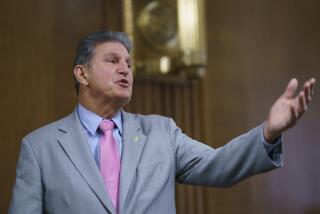U.S. Trade Deficit
- Share via
Jack Margolin (Letters, Aug. 30) referred to economics as “the dismal science” when he offered a criticism of U.S. Nobel laureates who are in agreement that this nation should pursue anti-protectionist policies. Yes, economics to the Jack Margolins of this world may be “dismal,” and the letter strongly supports this belief when the writer shows his lack of knowledge about economic matters.
To begin with, the national debt and the current deficit are not functions of our trade deficit. It’s the other way around. Deficits lead to actual and expected internal economic problems, which cause foreign nations to cut their demand for our goods. For example, inflation and potential inflation cause our prices to be higher than those abroad. As a result prices abroad become attractive and so we buy there, with dollars. The result is a trade deficit.
But where do these dollars go? These dollars come back home. In recent years they have come back in the form of investment dollars, due to high interest rates. These investment dollars have kept our economy moving forward, in spite of continually rising federal deficits.
Thus, our unemployment rate has fallen. Moreover, as we import more we require more and more employment to service these imports, both at the pier and once the goods are in the hands of consumers. What this means is a shift in employment, not unemployment.
Finally, were we to impose severe trade restrictions on imports would foreign nations just sit back and do nothing? Of course they would not. They would retaliate. In the extreme, all trade would come to a halt, with resulting high unemployment here. Certainly this is not in our best interests if we want our unemployment rate to continue to fall. Such a situation would truly be “dismal.”
RICHARD A. BILAS
E.C. Reid Professor of Economics
California State University
Bakersfield
More to Read
Sign up for Essential California
The most important California stories and recommendations in your inbox every morning.
You may occasionally receive promotional content from the Los Angeles Times.












